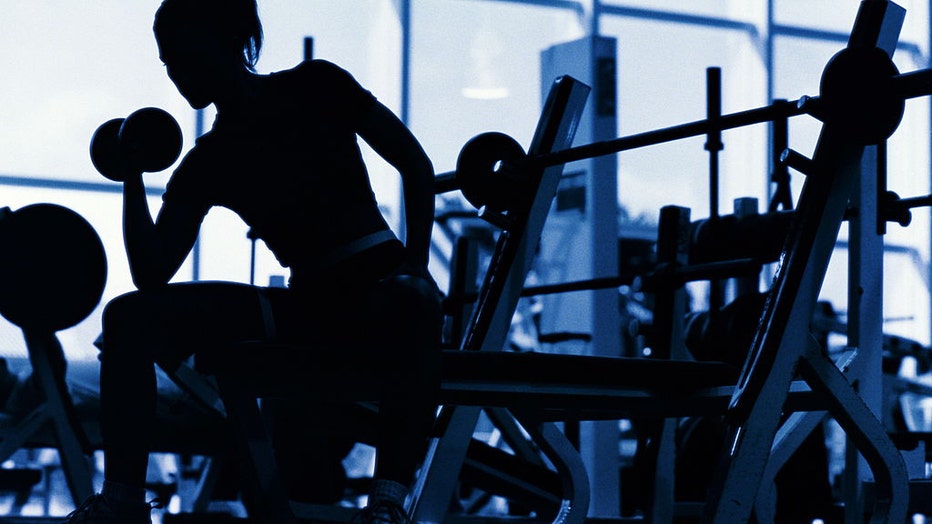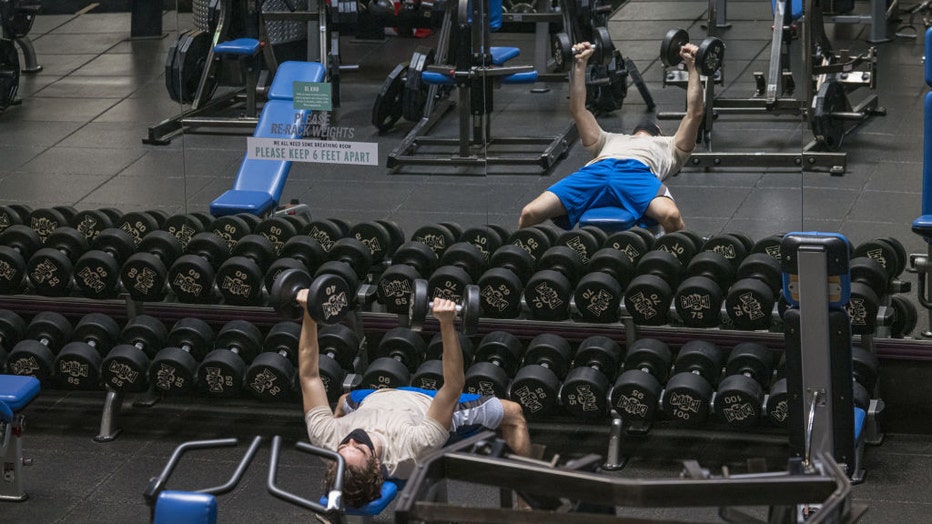AI may help shorten workouts to 20 minutes and still unlock 'fountain of youth'
People exercise on stairmaster machines at a gym. (Patrick T. Fallon/Bloomberg via Getty Images)
Artificial intelligence could hold the key to "the fountain of youth" for America’s aging population, as AI-powered fitness equipment stakes a bigger claim in the world of health, according to the CEO of a high-tech gym franchise.
When COVID-19 pandemic restrictions kept Americans from public spaces, including gyms, people flocked to innovative ways to stay in shape, including downloading apps such as FitnessAI, which generates personalized workouts using AI, or buying personal expensive AI-powered equipment.
The Exercise Coach, which has fitness studios across the country and overseas in Japan, has risen in popularity since 2020 by the tune of 125%, according to the company’s CEO Brian Cygan. The fitness group had 80 studios in March 2020 compared to 180 locations as of May, Cygan told Fox News Digital.
"The fitness industry will always be spawning new and interesting ways for younger, intrinsically motivated individuals to exercise," Cygan told Fox News Digital, explaining that he "only see[s] things accelerating" with The Exercise Coach in the future.
"I do think that we are on the cusp of changing the way people think about and optimize aging though with AI guided, coach-led strength training."
AI TOOL GIVES DOCTORS PERSONALIZED ALZHEIMER’S TREATMENT PLANS FOR DEMENTIA PATIENTS

FILE-Woman lifting weights (Photo by Zoran Milich/Getty Images)
The gyms use equipment from a company called Exerbotics, which Cygan described as "a line of smart strength training machines that super-powers our coaching efforts." The equipment allows Exercise Coach trainers to measure the whole-body strength levels of gym members, and then provide them "ability-matched strength training workouts that are ideally suited for them."
AI HEALTH CARE PLATFORM PREDICTS DIABETES WITH HIGH ACCURACY BUT 'WON'T REPLACE PATIENT CARE'
"Exerbotics smart resistance and bio-feedback change resistance levels in real-time to accommodate where an exerciser's muscles are stronger or weaker," Cygan said. "For example, more resistance is encountered during the lengthening (eccentric) phase of a movement."
"This eccentric overload is impractical for most people with standard weights, yet research demonstrated it is an amplifier of strength development," he continued. "When resistance levels are precisely dosed and users are guided by on-screen feedback, they work at higher effort levels and apply the most effective stimulus for improvement possible."
AI-POWERED MENTAL HEALTH DIAGNOSTIC TOOL COULD BE THE FIRST OF ITS KIND TO PREDICT, TREAT DEPRESSION

FILE-A person lifts weights at a gym. (David Paul Morris/Bloomberg via Getty Images)
Cygan highlighted that the AI-powered machines are able to outperform human trainers, specifically how they can measure "force output and calculating strength, tracking performance in real-time, instant calculations related to progress analysis and conversion of performance data into a recommended effort for next time." The machines, however, are unable to "care about people’s goals, obstacles, pain points, need for support," like human coaches.
What is also notable about the workouts: They last 20 minutes per session.
"Gone are the days of a one-hour workout several days a week," Cygan said. "A plethora of research and our internal data indicate that people can experience maximal strength training results from just two 20-minute workouts per week. Any more than that is not only a waste of time but will be counterproductive when someone is working at optimal levels of intensity."
The fitness CEO said that the shorter workout times appeal to people with hectic schedules, but that the regimens and technology are suited for people of all ages and fitness levels. The Exercise Coach has "intentionally aimed" their brand at aging Americans.
CHATGPT FOR HEALTH CARE PROVIDERS: CAN THE AI CHATBOT MAKE THE PROFESSIONALS' JOBS EASIER?
"The problem we have in this country isn't helping athletes get 1% stronger," Cygan said. "It's tackling the quality of life issues and health care burden that we are facing as a nation due to the tsunami of aging Americans that is underway."
Citing AARP and U.S. Census Bureau data, Cygan said that by 2030, the U.S. for the first time will have more 65-and-older residents than children. He said personalized strength training can "revolutionize the health and vitality" for aging Americans, who are expected to live longer than previous aging generations.
"It could be the population health fountain of youth if properly leveraged," he said. "This is why we created technology that maximizes effectiveness, motivation, and data-driven guidance. Through our technology, we coach millions of ideal strength training sessions per year across America and even in Japan."
Cygan said the business plans to only grow larger, explaining he hopes to continue partnering "with insurers and medical institutions to have the greatest impact on aging in America."
CHATGPT AND HEALTH CARE: COULD THE AI CHATBOT CHANGE THE PATIENT EXPERIENCE?
Artificial intelligence is currently a hot debate in the nation’s capital and America at large, as tech leaders in Silicon Valley race to build more powerful AI systems following the release of OpenAI’s chatbot ChatGPT last year. Tech leaders and others who support the technology’s rise argue it will be another tool for Americans and businesses to prosper, while critics say the tech could lead to the downfall of humanity.
Cygan said that he believes The Exercise Coach’s "target demographics are rightly concerned about what generative AI means for the future of human society," but that his company is using AI "to do the things that are impossible for human coaches to do" which makes "our human coaches even better."
"AI and science have brought strength training into the 21st century," he said.
"However, our research and experience indicate that the encouragement and guidance of a friendly, knowledgeable human will never go out of vogue," he added. "In fact, we see that while many companies are reducing their human footprint, consumers appreciate more than ever when real people care about them as a person and what they are trying to achieve."
Get the latest updates on this story at FOXNews.com.

